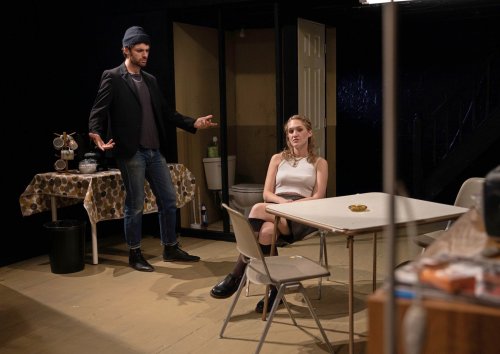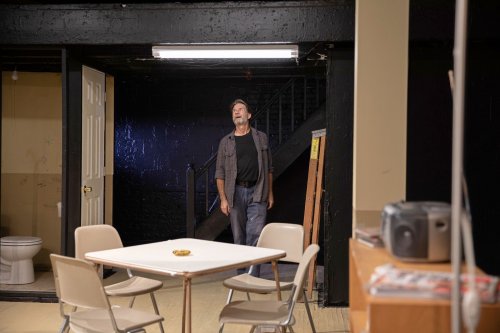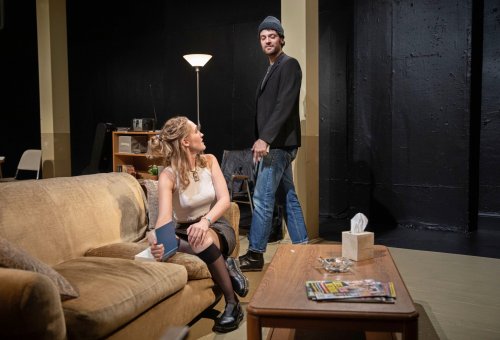Baby Foot
A show worth experiencing for skillful performances and a view of the world of a recovering addict.

Daniel Dorr and Hope Lauren in a scene from Tim Venable’s “Baby Foot” at the Walkerspace at the Soho Rep (Photo credit: Monique Carboni)
[avatar user=”Scotty Bennett” size=”96″ align=”left”] Scotty Bennett, Critic[/avatar]
Many people see a person’s first day in a drug rehab program as a positive moment of realization and acceptance by the person entering. The addict may see it as a step into a black hole of fear, anger, and a sense of profound sadness, which can be exhausting. The emotional stew one is thrown into is the reason that the first day is often one of rest, with the addict given time to relax and settle in. And, so it is with this story.
Baby Foot, written and directed by Tim Venable, follows the interactions between three addicts in the very early morning in the lounge room of a rehab facility. The two central characters are Alexis, who is leaving the program facility, and Blackie, who is on his first day. There is a third, pivotable character, Fred, the janitor, a recovering addict who has worked at the rehab facility for thirty years.
Baby Foot effectively deals with psychologically and emotionally heavy topics in a thought-provoking way without being overly dark. It has moments of humor within the serious drama but ultimately provides a sense of hope and fulfillment. It is a show worth experiencing for skillful performances and a view of the world of a recovering addict.
The story opens with Fred, masterfully played by Paul DeBoy, fixing a faulty fluorescent light fixture in the lounge of the rehab facility. Deboy shows him to be a thoughtful, nonintrusive presence with a clear perspective on the people who pass through this room. He has been clean and sober for thirty years.
Alexis enters with a guitar case and duffel. She has finished her time in rehab and is waiting for her ride to the airport. Hope Lauren skillfully embodies Alexis as an outwardly self-confident woman filled with fear and uncertainty. She has completed ninety days of rehab and is about to reenter the world, clean and sober for the first time since she was 16. She has a short but important conversation with Fred about leaving rehab and dealing with the struggles that are to follow. Fred has been an observer of rehab for over thirty years. He has seen what happens to people during and after their time in the program.

Paul DeBoy in a scene from Tim Venable’s “Baby Foot” at the Walkerspace at the Soho Rep (Photo credit: Monique Carboni)
FRED: You can tell the ones who come in here who ain’t gonna make it. Over the years I kinda developed a sense when they ain’t done yet, you know? You’ll be okay. It’ll be hard, but you built the foundation. Proud of you, Alexis.
Alexis’ anxiety is evident in her reply.
ALEXIS: I’d stay longer, maybe but my insurance –
The exchanges between Fred and Alexis in the opening scenes establish an important element in the story that is about to unfold: fear of leaving the familiar for the unknown.
Fred finishes his work and leaves the room. Sometime later, Blackie enters wearing a hat and carrying a duffel. It is his first day in rehab to try to kick his heroin addiction. He has been using a whole variety of drugs since he was 12 years old. Daniel Dorr introduces a character who appears focused and in control but whose anxiety and fragility lurk under the surface.
Under Venable’s deft direction, Dorr and Lauren skillfully convey the emotional and intellectual confusion inherent in addiction and in recovery. They both attract and repel each other with verbal sparring that underscores and contrasts their loneliness bordering on despair with their neediness for support and companionship. Their exchanges also reveal their anxiety and fear about stepping into the unknown. For Blackie, addiction is a familiar place, even if it is uncomfortable, and leaving it is a fearful thing, and for Alexis, rehab has become a comfortable space she has rarely known, and leaving it is a scary thing.
Baby Foot shows the different levels of dysfunction addicts outwardly project while trying to hide from the thing or things that drove them to hide in the cloud of denial and forgetfulness brought on by the high of intoxication. Leaving the “comfort” of addiction for a world of “real” feelings is a terrifying prospect. The leaving of the familiar, whether addiction or rehab, is the shared experience of Blackie, Alexis, and, interestingly, Fred.

Hope Lauren and Daniel Dorr in a scene from Tim Venable’s “Baby Foot” at the Walkerspace at the Soho Rep (Photo credit: Monique Carboni)
Blackie’s fear is stepping into that unknown liminal space of sobriety. Alexis has stepped away from the familiar of addiction into the world of rehab and must now navigate a world she has rarely, if ever, known, sobriety.
The surprising element in this story is Fred. His fear is still a genuine part of his thirty years of being “clean and sober,” as evidenced by his never truly leaving the rehab center. He has been reminded daily of his addiction within the safe and nurturing space. He has never really tested his resolve to remain sober, keeping his fear bottled up while doing his janitorial duties.
Fred: “Oh yeah. Picked up a pretty nasty morphine habit in Khe Sanh. After treatment, didn’t have anywhere to go, so I started doin’ odd jobs around the place. After a while I guess they figured what the hell, let’s pay him for it. Been the handyman ever since. You know, it never occurred to me to ask for a raise? Oh well.”
Lily Guerin’s scenic design and props effectively establish a sense of place and time, from the fluorescent lighting, to the well-worn couch, to a Foosball (Baby Foot) game table that gives the name to the play. Leanna Keyes’ lighting adds definition to the space and contributes to the changes in mood needed in various scenes.
Baby Foot (through September 3, 2023)
Dexter Street Productions
The Walkerspace at Soho Rep, 46 Walker Street, Manhattan
For tickets, visit https://babyfootnyc.ticketleap.com
Running time: 90 minutes without an intermission






Leave a comment